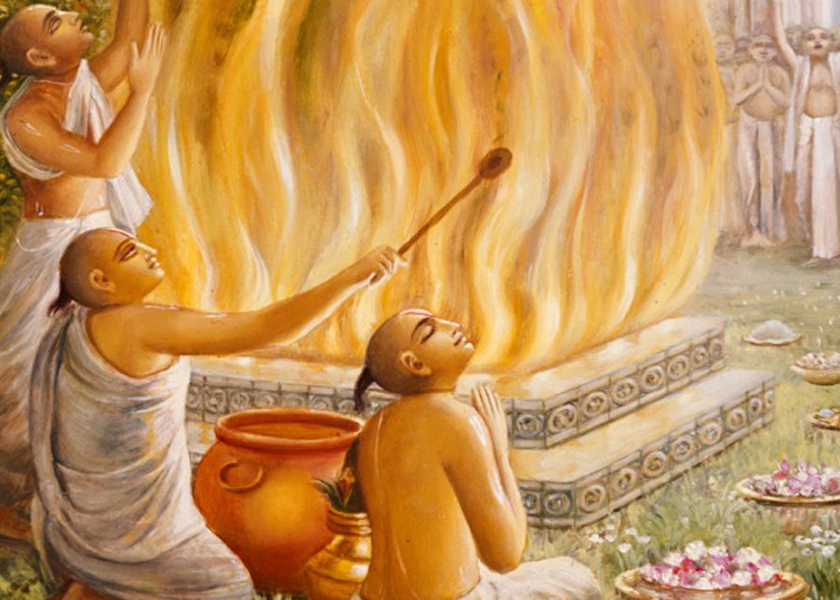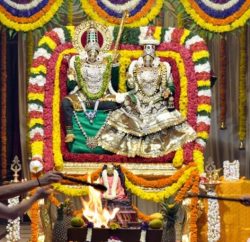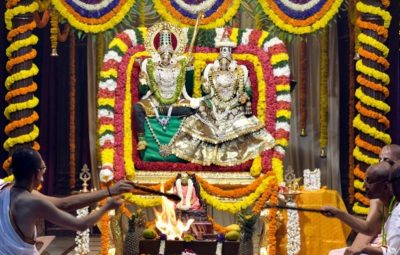Without an understanding of the philosophy, it is hard to answer questions on religion. Here are five questions with answers.

This is a humble attempt to create the right perspective on the questions raised in the movie PK. In our previous article we answered 5 of these questions and in this article we have taken another 5 questions. However without a holistic understanding of the philosophy it may be very difficult to understand the intricacies of religion. This is just an attempt to clarify certain doubts. For a thorough understanding we recommend that you read the books written by our founder-acharya, Srila Prabhupada.
Table of Contents
It looks like God is not answering my prayers. Why?
How do you know that God is not answering your prayers? God is our supreme well-wisher and He knows what is good for us. He alone can do what is good for us. Let us try to understand this through an analogy.
- The child went to its mother and asked for a chocolate; the mother did not give.
- A guest who visited to the house gave a chocolate to the child. The mother forcefully took it away and kept it inside the refrigerator.
- The child insisted again and again. The mother started beating the child.
- The child cried for some time. Later the mother called the child and gave a little portion of the chocolate.
Can you say that the mother was wrong? Why did she punish the child and give only a little portion of the chocolate later? When the guest gave the chocolate, she should have allowed the child to eat it. Why did she take it away forcefully? We cannot question the behavior of the mother. The mother is always concerned about the well-being of her child and whatever she does, it is for the benefit of the child.
God cares for each of us as we are His part and parcel. When we pray to God in general we seek only material favors and we treat Him as our order supplier. God wants to do ultimate good to us, He wants us to give up this material world and come to Him. He fulfills our material desires as per our karma, not as per our whimsical desires. God does not want to interfere in the karma as per which we get our happiness and distress based on the principle of “As you sow so you reap.”
Hope you got the answer. Do we need to explain further?
Why do religious teachers threaten people with fear of future punishment?

A warning is not a threat. If you smoke you will get lung cancer. Is it a warning or a threat? If you drink, your liver will get damaged – warning or threat? If you violate the traffic rules, you may meet with an accident. If you kill someone, you will be hanged. We live in a society and there are laws that govern the society to ensure smooth co-existence. If someone violates the laws, they are punished. The fear of punishment stops a person from engaging in such activities that result in inconvenience to others.
The laws of material nature are designed to ensure peaceful co-existence of all living entities in this material world. If you violate these laws and disturb the natural harmony, you will be punished. Such activities are called vikarma (forbidden activities). Be thankful to those who try to open your eyes. We are in the darkness of ignorance and the spiritual master opens our eyes and leads us in the path of light.
However, there are people who pose as religious teachers and try to exploit this fear for their personal benefit. People should be intelligent enough to identify such cheaters.
Different religions have different rituals. Why?

Religion is meant for connecting people to God. The ultimate purpose is to teach us how to love God and how to serve God. There may be many practices which are specific to the audience, but the primary principle does not change. Based on the time, place, circumstance and audience, there are changes made to the rituals and practices. Why do we need to focus on these differences? We say that India is a country with cultural diversity. We speak different languages, and our customs are different. But we are united as Indians.
Similarly, we should realize that we are all children of God and it is our privilege to love God. However we have forgotten our relationship with God. The purpose of religion is to teach us how to re-establish this lost relationship with God. Different people were taught differently. But the ultimate goal was the same. However, over a period of time, many superstitious rituals and practices were introduced and people, who do not have the right guidance, could not tell the difference. But when you develop cataract in your eye, you do not pluck out your eye. You get the cataract operated. Similarly we have to identify these wrong practices and remove them rather than questioning the relevance of religion.
Why aren’t we born with our religion stamped on our body?

Religion has nothing to do with the body. Religion gives us direction. It tells us how to lead our life. Real religion is eternal (sanatana-dharma) and it always remains the same. There are many faiths that developed over a period of time and people accepted such faiths. But as explained in the answer to the previous question, these faiths and rituals do not make religion. The purpose of religion is to help us achieve the life of eternity; a life full of knowledge. The Vedas ask us to come out of this non-permanent existence in the darkness of material ignorance. They ask us to move towards a life of eternity by traversing the path illuminated by the light of knowledge: asato ma sad gamaya – tamaso ma jyotir gamaya – mrtyor ma amrtam gamaya – this is the call of the Vedas.
Does God like flattery? Why do we flatter God?
God does not need flattery. We flatter someone for our own benefit – not for the benefit of the person who is getting flattered. We want facilities for our enjoyment in this material world and we think we can get that by flattering God. But God is not our order supplier. He is our compassionate father and well-wisher. He sanctions what is good for us. But we have to glorify the Lord (not flatter) for our own purification. When we express our gratitude and praise the Lord for what He has bestowed upon us, then we become purified. Are we not enjoying various God-given facilities (which are not man-made) – the air we breathe, the water from the rivers, the resources from the mountains and seas and even from the core of the earth – we extract so much to make our life comfortable from nature. Are we not supposed to express our gratitude? What is wrong in glorifying the one who created such facilities for our comfortable life? We did not create it and we say it is nature; but our common sense will accept that there can be no creation without a creator.
We have to acknowledge His supremacy and glorify Him for everything He has given us (not flatter Him to get more).










